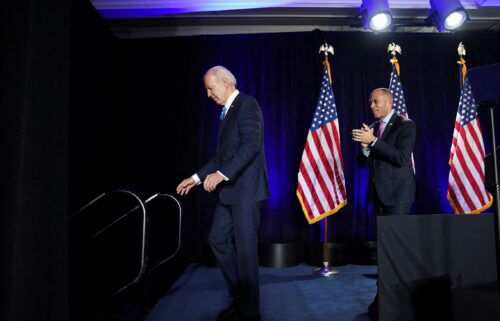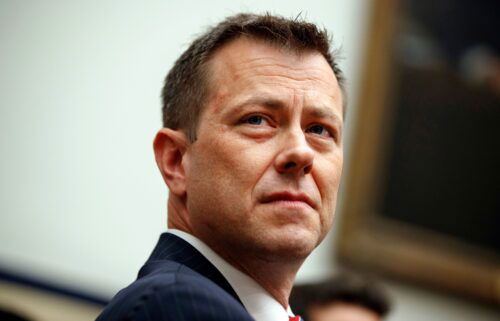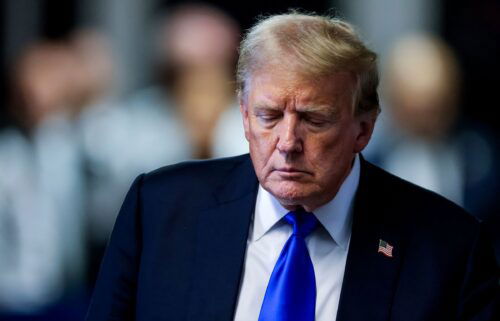ProPublica: Pence’s office pressured USAID to award grants to Christian groups in Iraq

Vice President Mike Pence’s office and political appointees have been pressuring the US Agency for International Development to direct its Middle East funding to preferred Christian groups in Iraq, an effort that career officials warned could be unconstitutional, ProPublica reports.
USAID last month announced grants to two Iraqi organizations that had been previously been rejected, ProPublica reported on Wednesday.
ProPublica, which cited internal emails and nearly 40 current and former US officials and aid professionals for its report, said political appointees — who typically are not involved in USAID grants — had significantly influenced the latest grants USAID awarded.
According to ProPublica, career officials worried that the Trump administration’s pressure to influence USAID funding risked violating the US Constitution’s establishment clause, which broadly prohibits government actions favoring one religion over another. Officials were also concerned over any perception of preferring Christians could further Iraq’s sectarian divides, ProPublica noted.
Muslims make up a majority of Iraq’s population. Christians, Yazidis and other religious minorities make up about 2%.
USAID rules state that decisions about awarding financial aid “must be free from political interference or even the appearance of such interference and must be made on the basis of merit, not on the basis of the religious affiliation of a recipient organization, or lack thereof.”
CNN has reached out to Pence’s office comment.
Pence’s spokeswoman, Katie Waldman, did not respond to ProPublica’s questions. A USAID spokeswoman, Pooja Jhunjhunwala, did not respond to ProPublica’s specific questions. But she told ProPublica that the latest grants were appropriate.
“The Trump Administration has made responding to the genocide committed by the so-called Islamic State of Iraq and Syria (ISIS) against religious and ethnic minorities a top priority,” Jhunjhunwala told ProPublica. “Assistance to religious and ethnic communities targeted by ISIS is not a departure from the norm, but rather a continuation of USAID’s rich history of promoting inclusive development and defending human dignity and religious freedom in our partner countries.”
In a statement to CNN, Jhunjhunwala denied anything inappropriate had been done and said the aid had followed “all laws and applicable federal regulations.”
According to ProPublica, Jhunjhunwala said the US government, in 2017 and 2018, had given more than $1.5 billion in assistance to Iraq. “The vast majority in areas inhabited by Sunni and Shia Muslims,” she said.
The Trump administration announced in July 2017 that USAID would send an additional $150 million to the United Nation’s Development Program’s Iraq stabilization fund. That money goes toward restoring basic services and jump starting economies in areas liberated from ISIS rule.
Pence, however, announced in October 2017 that the Trump administration will no longer fund “ineffective” programs run by the United Nations to help persecuted communities and will instead send money to such groups directly to persecuted communities through USAID.
“Our fellow Christians and all who are persecuted in the Middle East should not have to rely on multinational institutions when America can help them directly,” he said.
In January 2018, USAID renegotiated the terms of its agreement to the fund so that $55 million of a $75 million payment went toward vulnerable religious and ethnic minorities, according to a news release from the agency. That was the first tranche of the $150 million announced in July 2017.
And in June 2018 USAID started an $11.4 million program to help “historically marginalized and vulnerable communities” following a meeting between a US official and religious officials, including Yazidi representatives, according to an inspector general’s report.
In March 2018, USAID hosted a two-day workshop in Baghdad on new grants separate from the UN funding, which two Pence aides attended and mostly observed, ProPublica reported, citing four people present at the event or briefed on it. ProPublica reported that the two aides’ appearances “unsettled participants” and during the meeting, they had “objected to a programming idea, saying it would take too long and not be valuable.”
ProPublica reported one participant as saying, “people ‘assumed they were there for a political reason or to put pressure on the process.’ “
USAID announced its final grant decisions later that year, awarding funding to large established organizations and rejecting some smaller groups that did not have prior experience with the agency, ProPublica noted.
Two of the groups rejected by USAID included the Catholic University in Erbil and the Nineveh Reconstruction Committee, a coalition of three major Iraqi Christian denominations — a decision panned in a June 2018 Wall Street Journal op-ed by a GOP congressman and a former Reagan top official — the outlet said.
Pence directed the administrator of USAID, Mark Green, to travel to Iraq and report back on plans to send aid to the area quickly, which was first reported by The Washington Post. CNN has reached out to Green for comment.
Sources told ProPublica that Nick Ayers, the vice president’s chief of staff at the time, also called USAID chief of staff Bill Steiger to demand someone at the agency be “punished for the failure to provide aid to Christian groups quickly enough.” Ayers did not respond to ProPublica’s requests for comment and CNN has reached out to both Ayers and Steiger for comment.
The day after the op-ed was published, career official Maria Longi was reassigned from her role as the top official in the agency’s Middle East bureau, and was replaced with a political appointee, according to The Washington Post.
Longi’s replacement in USAID’s Middle East bureau, Hallam Ferguson, wrote in an email last November, obtained by ProPublica, about the White House’s pressure to reroute Middle East aid to religious minorities, particularly Christian groups.
“Sometimes this decision will be made for us by the White House (see… Iraq! And, increasingly, Syria),” Ferguson wrote, according to ProPublica. “We need to stay ahead of this curve everywhere lest our interventions be dictated to us.”
CNN has reached out to Ferguson for comment.
In August, the Trump administration eyed canceling billions of dollars in foreign aid funding. But a senior administration official told CNN that projects spearheaded by Ivanka Trump and Pence that focuses on aiding Christian minorities around the world would not be subject to possible aid cuts.
Last month, USAID announced near $4 million in new grants to six Iraqi organizations “to help religious and ethnic minorities targeted by ISIS” — including the Catholic University in Erbil and Shlama Foundation, a small charity that primarily serves Christian Iraqis. Both groups had been rejected for 2018 grants from USAID, ProPublica noted.
ProPublica reported that USAID’s inspector general is investigating some of the agency’s activities in Iraq.



